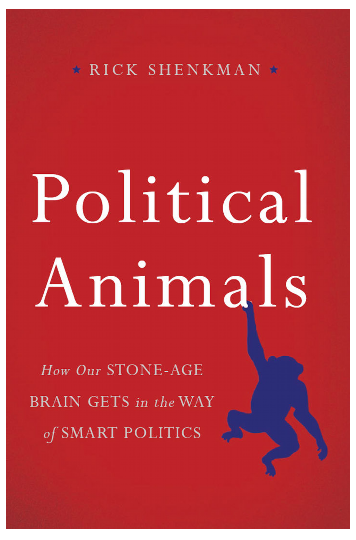
Alternet has published an interview with the author of a book I have recently twice posted about:
How Our Stone-Age Brains Get in the Way of Smart Politics
My related posts:
A few excerpts from the interview . . . . First, on evolutionary psychology itself:
Robin Lindley: . . . . What did you learn from neuroscientists and others about why our brain tends to work this way?
Rick Shenkman: Whatever you make of Evolutionary Psychology, and many people hold it in dim regard, its main assumption seems very compelling to me and that is that our brain evolved to address the problems we faced during the Pleistocene, a two and a half million long period. See a leopard in the jungle and you jump. That’s your automatic brain at work. Your instincts. You don’t have to think about jumping, you just do. We jump out of the way because people who jumped when danger approached were more likely to survive and pass along their genes than those who didn’t.
A scientific consensus now exists that the brain works by using either System 1 or 2, as Daniel Kahneman explains in his book, Thinking Fast and Slow. System 1 is automatic thinking, System 2 is reflective. I found this fascinating. It helped explain how we respond to politics. Eventually, I came to the conclusion that we respond to politics most of the time using System 1. This insight wasn’t my own. I first encountered it watching a video lecture by the Cornell social scientist David Pizarro. It made a deep impression. Fortunately, I came across it early on in my research.
We are more Mulder than Scully . . . despite the strongest wishes of us sceptics that it be otherwise.
Robin Lindley: Our trust in leaders is often misplaced. You’re an expert in presidential history and you recount numerous examples of when presidents lied but there was little public reaction, such as when Grover “Jumbo” Cleveland failed to disclose he had cancer and Lyndon Johnson lied about the Gulf of Tonkin incident and Richard Nixon lied about Watergate. The public response was muted and you attribute that response to an innate credulity. How do you explain that?
Rick Shenkman: Human beings are basically believers as Harvard’s Daniel Gilbert has demonstrated. To borrow a line from another social psychologist, we’re more like Mulder than Sculley from the “X Files.” The reason is fairly straightforward. We couldn’t accomplish much if we went around skeptical of everything. Once we decide on a matter we are inclined to consider it settled unless a good reason comes along to make us question it. That gives our brain a chance to focus on threats and opportunities around us. Experiments with sea slugs that I cite in the book show this is a feature of the animal brain. It has to do with our habituation to information. Once we become accustomed to something we stop thinking about it. We grow bored by it. That’s our brain helping us keep focus on what’s new. It’s a survival instinct and it shows up, as I say, even in snails, as the scientist Eric Kandel proved half a century ago.
Another factor comes into play. We want to believe in our leaders. So it takes us quite a bit of time to become convinced that they aren’t all they’re cracked up to be. And once we cast a vote in favor of a leader we tend to come to their defense when attacked. That’s our partisan brain at work. We like being consistent. So if we decided that someone is a good leader we tend to dismiss any evidence to the contrary. Our brain literally shuts off the flow of electricity to neurons telling us something we don’t want to hear that might make us doubt our beliefs.
There are other factors, to be sure. I spend several chapters addressing these.


